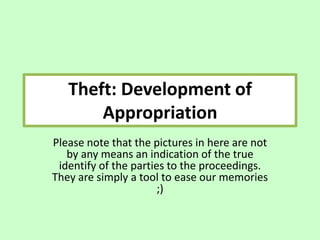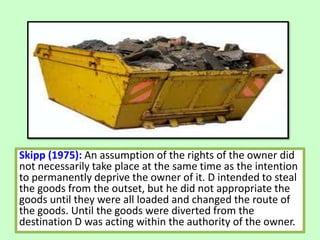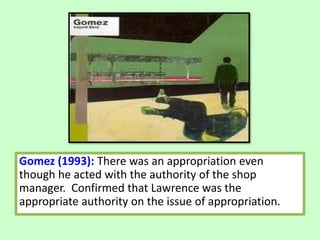Theft: Appropriation Common Law Development
- 1. Theft: Development of Appropriation Please note that the pictures in here are not by any means an indication of the true identify of the parties to the proceedings. They are simply a tool to ease our memories ;)
- 8. Theft: Development of Appropriation Answers Please note that the pictures in here are not by any means an indication of the true identify of the parties to the proceedings. They are simply a tool to ease our memories ;)
- 9. Eddy v Niman (1971): The question for the courts to consider about appropriation was: had D done an act inconsistent with the true ownerĪ»s rights? Here, D had taken goods from the shelf and placed them in a trolley provided by the store and had not done an act inconsistent with the rights of the owner.
- 10. Lawrence (1971): The driver argued had appropriated the money despite the student consenting to him taking it.
- 11. McPherson (1973): Placing of the bottles in a shopping bag with intent to steal, amounted to appropriation.
- 12. Skipp (1975): An assumption of the rights of the owner did not necessarily take place at the same time as the intention to permanently deprive the owner of it. D intended to steal the goods from the outset, but he did not appropriate the goods until they were all loaded and changed the route of the goods. Until the goods were diverted from the destination D was acting within the authority of the owner.
- 13. R v Morris (1983): As soon as D switched the price labels he had Ī«appropriatedĪ» the property.
- 14. Gomez (1993): There was an appropriation even though he acted with the authority of the shop manager. Confirmed that Lawrence was the appropriate authority on the issue of appropriation.














